Examples / SampleMgr
Hz.Plugins . Hz.Builtins . 3rd Party Plugins
SampleMgr . StreamMgr
Audio IO . MIDI . OSC
MusicAPI . Plot
Wherein we show the use of
SampleMgrto ensure your samples files are in order.
listRepos.js
In this example, we use SampleMgr to enumerate the default/factory sample sets known to SampleMgr. NB: this information is also available through the Sample Manager Dialog.
// list contents of default repolist.
const repolist = await SampleMgr.Init(); // default repolist
const reponames = repolist.GetRepoNames();
const banknames = repolist.GetBankNames();
console.log(`repolist has ${reponames.length} repos ${reponames}`);
console.log(` ${banknames.length} banks\n${banknames.join("\n")}`);
for(let banknm of ["MIDIJS/FatBoy", "VCSL", "DrumKits/CasioVL1"])
{
let voices = repolist.GetBank(banknm).GetVoiceNames();
console.log(`bank ${banknm} has ${voices.length} voices: ${voices.slice(0,5)}...`);
}
samplemgr.js
In this simple example, we use SampleMgr to ensure that the "FatBoy/accordian"
samples are loaded into your workspace. Next we provide them to Hz.Samplo
via its LoadPreset method. Finally we play a few notes.
let bank = "FatBoy";
let voice = "accordion";
let voiceref = `${bank}_${voice}`;
// wait for samples to be downloaded (cached, if necessary).
let asamps = await SampleMgr.PreloadSamples(bank, voice);
// setup our audio pipeline
let scene = await Ascene.BeginFiber(this);
let inst = scene.NewAnode("Hz.Samplo"); // has Reverb built-in.
let dac = scene.GetDAC();
scene.Chain(inst, dac);
await scene.Sync(); // <--- wait for node creation
inst.SetParam("/gain/Gain", 12);
inst.SetParam("/reverb/Model", 1);
inst.Show();
// wait for samples to load into instrument
await inst.LoadPreset(asamps.AsPreset(), voiceref);
let run = [48, 49, 50, 51, 52, 53, 54, 55, 56, 57, 58, 59, 60];
let notedur = scene.Seconds(.15);
for(let i=0;i<5;i++)
{
for(let n of run)
{
inst.NoteOn(n, .5 + .5 * Math.random());
await scene.Wait(notedur);
inst.NoteOff(n, 0);
}
}
The first time you run this script you should see the log activity associated with the downloading of the sample files for FatBoy/accordion.

Files are downloaded to your current Hz workspace cache which defaults
to ~/Documents/Hz/_cache/....
The second time you run this script, files are found to be present and the log shows this:

Here's what the GUI looks like:

remotemap.js
Here, we present the means to query remote or local samplemap files in a Strudel-compatible fashion. Note that caching is not part of this example.
const percSounds = ["sd:0", "bd:0", "hh"];
const tonalSounds = ["electric_piano_1"];
const maps = [
["github:eddyflux/crate", percSounds],
["github:eddyflux/wax", percSounds],
["github:tidalcycles/dirt-samples", percSounds],
["Hz:MIDIJS/FluidR3GM", tonalSounds],
];
let [remoteMap, sounds] = maps[0]; // <-- select a map
console.log(`FetchSampleMap: ${remoteMap}`);
let sampleMap = await SampleMgr.FetchSampleMap(remoteMap);
// Optional: enumerate the remote URLs associated with the sounds refererenced.
let urls = SampleMgr.GetSampleURLs(sampleMap, sounds);
console.log(`resolving ${sounds} => ${JSON.stringify(urls, null, 2).slice(0,400)}...`);
Here's some example output:
12:13 note FetchSampleMap: github:eddyflux/crate
12:13 note resolving sd:0,bd:0,hh => {
"sd": [
"https://raw.githubusercontent.com/eddyflux/crate/main/crate_sd/snare-aprilshowers-1.wav"
],
"bd": [
"https://raw.githubusercontent.com/eddyflux/crate/main/crate_bd/kick-takecare-1.wav"
],
"hh": [
"https://raw.githubusercontent.com/eddyflux/crate/main/crate_hh/closedhh-deepfind.wav",
"https://raw.githubusercontent.com/eddyflux/crate/main/crate_hh/closedhh-loveso...
playremotemap.js
This example is not reproduced here since it's a page or more of code. Just
right-click-copy this example and inspect and run it from your workspace.
playremotemap is a continuation of the prior example that additionally ensures
the sample files are cached locally. Next we initialize Hz.Samplo
and finally play a few sounds.